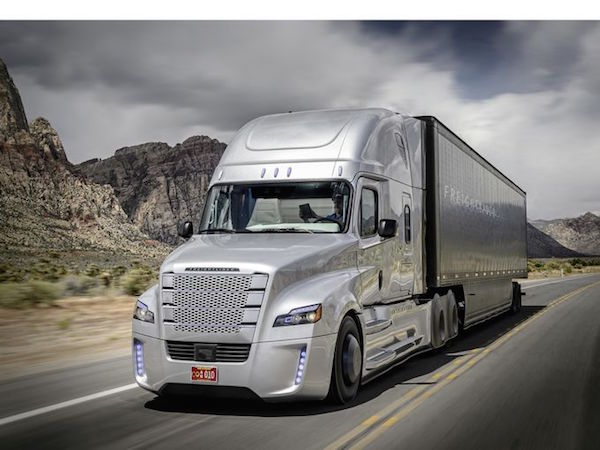Certainly the automotive industry regards the self-driving technology as a priority because American companies don’t want to miss out when some foreign businesses are quite keen on it.
Many of the news stories emphasize the safety aspect of vehicles not being driven by imperfect humans, so we will likely hear about those benefits during next Wednesday’s Senate Hearing: Transportation Innovation: Automated Trucks and Our Nation’s Highways.
Below, Daimler tested a big-rig self-driving truck in May 2015 over Hoover Dam in Nevada where automated vehicles are permitted if a driver is present for emergencies.

Not all self-driving news is upbeat however. It was recently reported that some self-driving vehicles could become confused by street signs with graffiti (Autonomous car brains fooled by graffiti on street signs, Fox News, August 7). The automotive computer might interpret a redecorated stop sign as signifying a speed limit of 45 mph. So the guarantee of safety is not quite there yet.

The big picture is that America faces enormous job loss from automation, and blue-collar jobs will likely be among the first to go, but they won’t be the only ones. Oxford University researchers forecast in 2013 that nearly half of American jobs were susceptible to being automated within 20 years.
The Los Angeles Times reported a year ago: “There are 1.7 million truckers in America, and another 1.7 million drivers of taxis, buses and delivery vehicles.” Many of those jobs are threatened, and Washington apparently has no Plan B for what millions of unemployed citizens should do to support themselves in the not-too-distant future.
The least the government could do is cut back severely on immigration, because the automated future won’t require imported human workers.
Remember: Automation makes immigration obsolete.
House Passes Bill to Speed Introduction of Self-Driving Cars, Bloomberg, September 6, 2017U.S. House lawmakers passed a wide-ranging bill to speed the introduction of self-driving vehicles championed by tech and auto companies racing to develop and deploy the technology.
“With this legislation, innovation can flourish without the heavy hand of government,” Ohio Republican Bob Latta said on the House floor ahead of the voice vote in the chamber Wednesday. Latta is chairman of the House Energy and Commerce subcommittee that developed the legislation.
The action now moves to the Senate, where Republican John Thune of South Dakota and Democrats Bill Nelson of Florida and Gary Peters of Michigan are leading work on legislation of their own. The trio serve on the Senate commerce committee, which on Wednesday announced a Sept. 13 hearing to examine autonomous commercial vehicles and how they may fit into the Senate’s self-driving vehicle legislation. The House bill only applies to passenger cars and light trucks.
The House bill would put the National Highway Traffic Safety Administration in charge of regulating self-driving car safety and preempt competing rules at the state level. Manufacturers would eventually be able to introduce as many as 100,000 self-driving cars per year that don’t comply with current safety rules that assume the presence of a human driver. It also instructs NHTSA to develop new standards for self-driving cars. Companies must draft security and privacy plans for autonomous vehicles and document their approach for ensuring self-driving car safety.
(Continues)